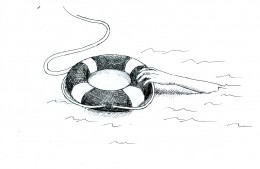
There is a wrong way to talk about rape. The ways in which we discuss and respond to sexual assault and violence need to change on several levels. The way we interact with survivors, the way we protect strangers and the language we deem acceptable in society can actively harm sexual assault survivors by brushing off and delegitimizing their experiences and their pain.
In the event that sexual assault does occur, our response — as friends and peers — must be delicate and nonjudgmental. Sixty percent of rapes are not reported to the police. The odds are already against the survivor in finding the strength to come forward, and one dismissive response can alienate a survivor of sexual assault and imbue a sense of shame. Though our campus offers resources through the University Police Department, residential communities, Decker Student Health Services Center and the Counseling Center, sometimes the most impactful response can come from a friend. That response can be one of sympathy and comfort in a time of emotional trauma, encouraging survivors to come forward. But a dismissive or disbelieving reaction can have the opposite effect, leaving survivors to seek no further support.
What about when it’s not a friend, but a stranger? We all like to think that if we saw something suspicious, we would act, but the fact of the matter is that we all see things Downtown on the weekends that fall into some kind of moral gray area. The average Binghamton University student is not going to witness an explicit act of rape, but we see other problematic acts every weekend: a girl at the bars being groped without her consent, or being led away from her group of friends; the couple who seem to be dancing comfortably, until you realize one of the two can barely stand.
Though these stories are cringe-worthy, all too often the response stops with a cringe. That’s not enough. We must create a campus climate in which bystanders feel a responsibility to step into these situations instead of laughing it off as another night at the Rat. This only normalizes the behavior, and misses an opportunity to show offenders that predatory behavior will not be tolerated in our community.
We are asking you all to be brave. When you see someone on the dance floor looking uncomfortable, or too drunk to know who he or she is dancing with, go over and make sure that person is in a position he or she wants to be in. The worst thing that happens is that you have misread the situation and both partners tell you off. We must not let the fear of embarrassment or social faux pas keep us silent when we could be protecting our peers.
There is more we can do to help in changing the way we talk about sexual violence. We need to stop participating in the subtle and constant desensitization of rape and sexual assault. What does it say that we as a society have made “Law and Order: SVU” a show that has run for 15 seasons?
Even the most powerful words can lose meaning when taken out of proper context. It’s time to reclaim the word “rape” and stigmatize its inappropriate use.
Expressions like “I raped that test” are not only tasteless, but create an atmosphere in which rape is not taken seriously. Rape humor desensitizes us all and is a disturbing reminder for victims of sexual assault. We can talk at length about the prevalence of rape culture and means of eradicating it, but if we are unwilling to tell our peers to stop making light of the word “rape,” these efforts lose effectiveness.
Rape isn’t something that only happens to other people. Sexual assault occurs within our social circles, among our friends and acquaintances, and affects both men and women. We do not have the luxury of sitting by idly. Reclaim the word, speak up, take action, show solidarity and throw a lifeline to those who may not even realize they need it.


